A Visit to the Academy’s Reading Room
Why do we keep books like Muslime im säkularen Rechtsstaat (Muslims in Secular Rule of Law), Diaspora Identities, or z.B. 650 Jahre Rixdorf (E.g. 650 Years of Rixdorf) at the Jewish Museum? Answering this question is the task of the Academy Programs on Migration and Diversity. How to find these books, however, falls to the library.
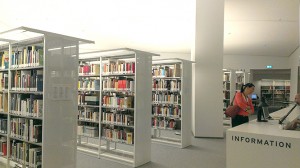
Reading room of the Jewish Museum Berlin’s library
© Jewish Museum Berlin, photo: Mirjam Bitter
Imagine that you want to learn about social structures, clubs, and immigrant biographies in Berlin, particularly in Kreuzberg, to which you yourself moved from Hesse two years ago. After visiting the museum one fine Sunday afternoon, you take a look at the new Academy, where, you heard, a friend of yours recently attended an event about the ‘new Germans.’ The Academy is closed on the weekend, but a museum host informs you that it has a library. You return on Monday and ask in the reading room about Turks in Kreuzberg. The librarian would love just to tell you, “second shelf on the left, all the way to the back – what you’re looking for is right there.” Unfortunately, it’s not quite that simple. → continue reading
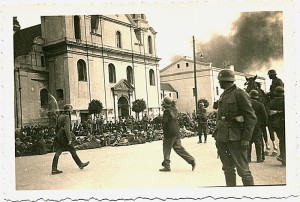
Photograph from World War II. The sellers priced it at 3000 euros.
The financial crisis of 2007 had an impact both on the countries of Western and Eastern Europe. The złoty may still glitter but it has long since ceased to be the “golden coin” Polish currency was originally named for. Unemployment and stagnant economic growth, rising real estate prices and declining purchasing power have put the brake on Poland’s economic recovery. The Netherlands has likewise been in recession for years. Declining competitiveness, private debts, state-subsidized home ownership, the low retirement age and the expensive health care system have fed uncertainty and repeatedly paved the path to success for the Freedom Party of the populist xenophobe Geert Wilders.
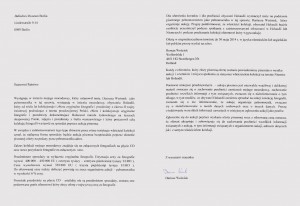
The Polish letter of offer as we received it.
This downward spiral in state treasury and personal funds led a couple of Polish resp. Dutch wheeler-dealers to scrape the barrel for a bilateral business model. Crafty Dariusz Woźniok and his fly-by-night Dutch client somehow managed to get their hands on infantrymen’s photos from the Second World War—whether as thieves or buyers it is impossible to say. Maybe they were embittered by the fact that no share in the tidy profits made from material goods ever came their way, from the export of Polish geese, strawberries, potatoes and beetroot, for example, or of Dutch cheese and tulips. Maybe they hatched their business plan in an Amsterdam coffee shop and had simply smoked one hash pipe too many. Whatever the case, they figured: “It was a sure bet that snapshots of ghettos and so-called ‘Jewish actions’ in early 1940s Poland could be sold off as ‘Holocaust-ware’ to Jewish Museums—so why not make the most of an historic windfall?” → continue reading
An Interview with Elena Bashkirova
From 7 to 11 May, we will host a chamber music festival in the museum’s Glass Courtyard. Katharina Schmidt-Narischkin and Sylvia Winkler of our press office spoke in advance with the festival’s director Elena Bashkirova.
Press office JMB: As festival director, what themes have you chosen to emphasize this year?
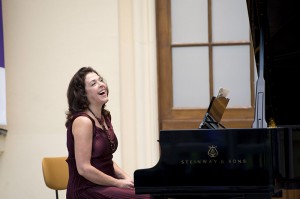
Elena Bashkirova, festival director and pianist
© Monika Rittershaus
Elena Bashkirova: Our themes have been determined this year by two anniversaries: on the one hand, the start of the First World War 100 years ago and its impact on music; on the other hand, the 150th birthday of Richard Strauss. Both anniversaries augur a varied program for “intonations”: 1914 saw an astonishing richness of musical styles, which our concerts will reflect. And Strauss composed chamber music nearly his entire life, so I have a wide range of pieces and genres to choose from.
Every year at “intonations,” chamber music classics can be heard together with unknown works. What composers should visitors expect to discover in this third season?
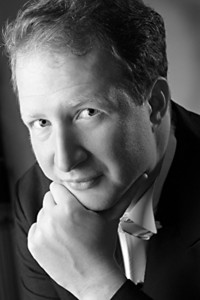
David Robert Coleman, composer and conductor © private
Rudi Stephan was an extraordinary discovery for me. I heard Music for Orchestra and Violin a few years ago here in Berlin. I was impressed and deeply touched by it. As I was putting together the programs for “intonations,” I found his gorgeous chamber music and was delighted to have the chance to present it here with my colleagues. Rudi Stephan died in the war when he was 28. Given his talent, he would otherwise have certainly provided us with more outstanding music.
There will also be another world premiere: the fourth concert, on Saturday 10 May, will open with David Coleman’s “Three pieces for clarinet and piano.” Another significant composer this year will be Karol Szymanowski. He has his own tonal language, writing hauntingly beautiful music that unfortunately is played much too seldom. → continue reading




